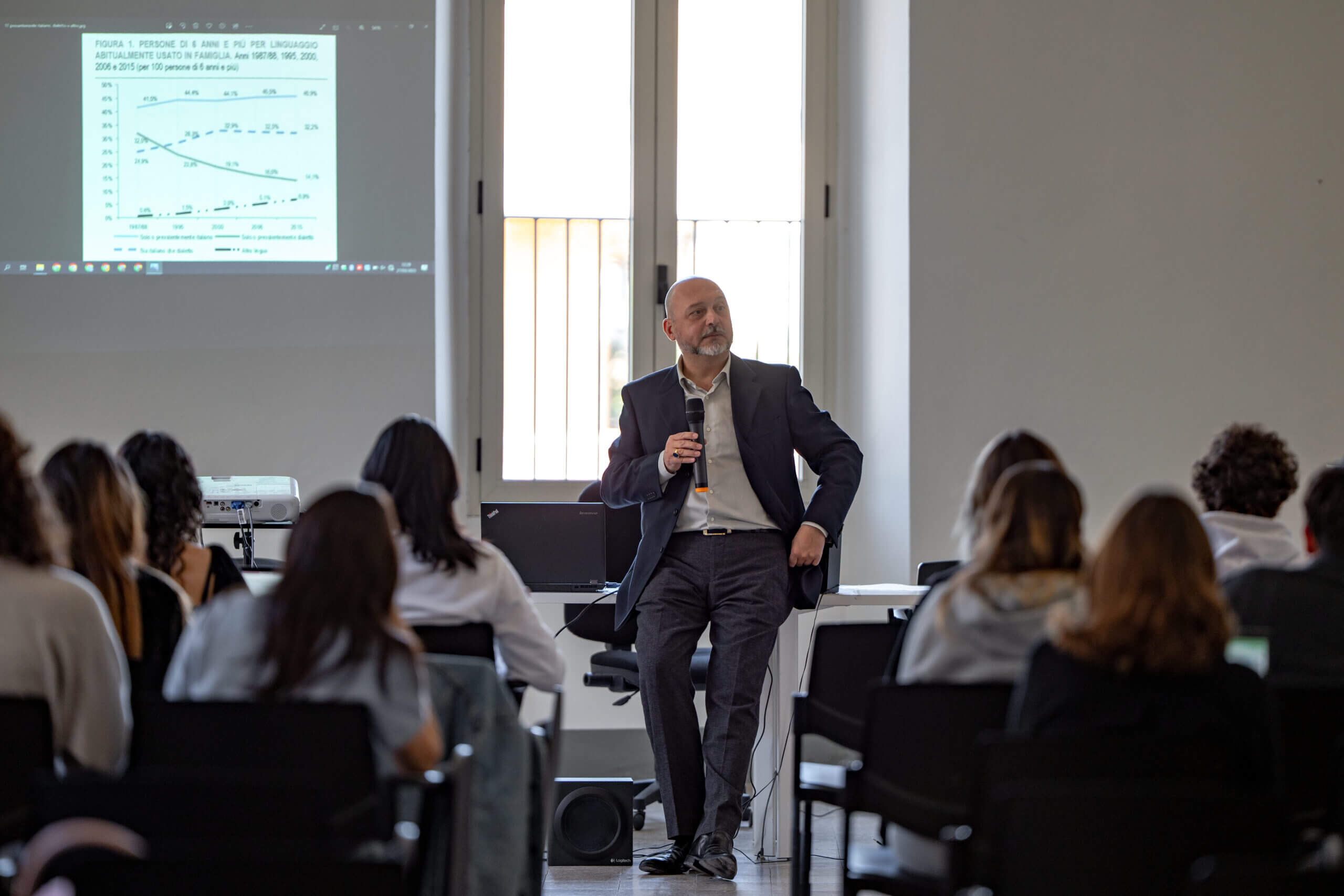
Areas of Study
What will you study
Unicollege provides a diverse, complementary, and multidisciplinary academic infrastructure that consists of 9 schools, and 50+ courses – that span from STEM subjects to humanistic disciplines and areas. Each school is dedicated to prestigious characters of the Italian cultural scenario and that are known for contributing to global intellectual wealth and progress.
Schools are headed by top scholars and professionals, who actively operate in the given discipline and that regularly update content, as well as academic inter-relations across courses and departments.









- Introduction to Academic Writing Develop essential academic writing skills, focusing on constructing clear, coherent, and well-organized essays. Learn techniques for thesis development, argumentation, research, and proper citation to excel in higher education.
- Creative Writing, Personal Expression & Lateral Thinking Explore various forms of creative writing, including poetry, short stories, and personal narratives. Enhance your ability to think outside the box and express yourself creatively through engaging writing exercises and peer feedback.
- Introduction to Literature & Liberal Studies
Dive into foundational literary texts and key concepts in liberal studies. This course encourages critical analysis and discussion, helping you understand the interplay between literature, philosophy, and society. - Survey of Italian Literature: From Ancient Icons to Revolutionary Voices
Trace the development of Italian literature from classical works to contemporary narratives. Analyze themes of identity, revolution, and tradition through close readings of influential Italian authors.
- Exploring Communications through the Italian Palette: Advertising, Media, & Arts Investigate the role of advertising, media, and the arts in shaping communication within Italian culture. Study iconic Italian brands and media outlets to understand their impact on global and local audiences.
- Diversity & Inclusion in Italian Media: A Multidisciplinary Approach Examine how Italian media addresses diversity and inclusion. Integrate perspectives from media studies, sociology, and cultural analysis to understand the representation and portrayal of diverse groups in Italian media.
- Introduction to the Italian Language (via Different Curricula: Art, Culinary Arts, Fashion, Music, Opera, Visual Arts)
Learn Italian through specialized curricula that integrate language learning with art, culinary arts, fashion, music, opera, and visual arts. This immersive approach enhances language acquisition through cultural context. - Learning Italian through Experience: A Montessori Approach Adopt the Montessori method to learn Italian through hands-on activities and experiential learning. This course emphasizes self-directed exploration and practical usage of the language in real-life scenarios.
- Introduction to Foreign Languages Choose from a variety of foreign languages, including Arabic, Chinese, French, German, Korean, Russian, Spanish, and Portuguese. Develop foundational language skills through interactive lessons and cultural immersion activities.
- Exploring Philosophy: From Ancient Beliefs to Contemporary Issues Journey through the history of philosophy, from ancient thinkers to modern-day debates. Engage with philosophical questions and develop critical thinking skills by analyzing diverse perspectives on ethics, existence, and knowledge.
- Survey of Italian Art: From Ancient Civilizations to Contemporary Icons Explore the rich history of Italian art, from ancient civilizations to modern masterpieces. Analyze significant artworks and movements, understanding their influence on global art history.
- Immersive Fashion: Seeing, Touching, Wearing Experience the world of fashion through sensory engagement. Learn about fabric, design, and the creative process by interacting with clothing and accessories, fostering a deeper appreciation for fashion as art.
- Introduction to the History of Ancient Fashion: The Encounter between Ancient Egyptian, Greek, and Roman Traditions Study the evolution of fashion in ancient civilizations. Compare and contrast the styles, materials, and cultural significance of clothing in ancient Egypt, Greece, and Rome.
- Introduction to the History of Modern Fashion: Exploring the Secrets of Renaissance Fashion, Beauty, and Courtship Delve into the fashion trends of the Renaissance period. Understand how beauty standards and courtship practices influenced clothing styles and societal norms.
- World’s Fashion Icons: Dolce & Gabbana, Gucci & Versace Analyze the impact of renowned Italian fashion houses. Learn about the designers behind Dolce & Gabbana, Gucci, and Versace, and their contributions to global fashion trends.
- Drawing like a Master in Art Capitals: Introduction to Drawing Develop fundamental drawing skills inspired by masters from major art capitals. Practice techniques in sketching, shading, and composition to create your own artistic works.
- Immortalizing Beauty: Introduction to Photography Learn the basics of photography, including composition, lighting, and editing. Capture and enhance images to express creativity and document the world around you.
- Introduction to Museum Studies Explore the role of museums in preserving and presenting art and history. Understand museum operations, curation processes, and the significance of exhibitions in cultural education.
- Curating an Art Show Gain hands-on experience in organizing an art exhibition. Learn about selecting artworks, designing layouts, and managing logistics to create a cohesive and engaging art show.
- Curating a Fashion Show
Plan and execute a fashion show from concept to completion. Understand the elements of runway design, model coordination, and event management to showcase fashion collections effectively.
- Introduction to Economics Understand the fundamental principles of economics, including supply and demand, market structures, and economic indicators. Apply these concepts to analyze real-world economic issues.
- Introduction to Business Explore the basics of business operations, including management, marketing, finance, and entrepreneurship. Develop skills necessary for starting and running a successful business.
- Introduction to Management Learn key management theories and practices. Focus on leadership, decision-making, strategic planning, and team dynamics to effectively manage organizations and projects.
- Introduction to Global Affairs & Political Science Examine the complexities of global politics and international relations. Study political theories, global institutions, and contemporary issues shaping the world today.
- The Role of Italy in Contemporary Geopolitics: Introduction to Geopolitical Analysis Analyze Italy’s position in global politics. Understand Italy’s geopolitical strategies, alliances, and its influence on regional and international affairs.
- Middle East, the Mediterranean Sea, and the Atlantic: Exploring the Crossroads of Contemporary Politics Investigate the political dynamics at the intersection of the Middle East, Mediterranean, and Atlantic regions. Explore historical contexts and current events shaping these critical areas.
- Introduction to the History of Mafia
Study the origins and development of mafia organizations. Examine their social, economic, and political impacts on society through historical and contemporary perspectives. - Women of Mafia
Explore the roles and influences of women within mafia organizations. Analyze gender dynamics and the unique contributions of women in these clandestine networks. - Introduction to Criminology Understand the study of crime, its causes, and its effects on society. Learn about different theories of criminology and the criminal justice system’s responses to crime.
- Introduction to Forensics Delve into the science of forensic investigation. Learn about evidence collection, analysis techniques, and the role of forensics in solving crimes.
- Introduction to Cybersecurity
Gain foundational knowledge in protecting digital information. Study cyber threats, security measures, and ethical considerations in the digital age. - Italy as the Birthplace of Criminology Explore Italy’s contributions to the field of criminology. Study pioneering theories and practices that originated in Italy and their influence on global criminological studies.
- Pre-Calculus Prepare for advanced mathematics by studying functions, trigonometry, and analytical geometry. Strengthen problem-solving skills and mathematical reasoning essential for calculus.
- Algebra Master fundamental algebraic concepts, including variables, equations, and functions. Develop the ability to solve complex problems and apply algebraic methods to real-world situations.
- Introduction to Information Technology (IT)
Discover the basics of information technology, including computer systems, networking, and software applications. Learn how IT is applied in various industries and everyday life.
Introduction to Artificial Intelligence (AI)
Explore the principles of artificial intelligence, including machine learning, neural networks, and robotics. Understand the applications and ethical implications of AI technologies.
Introduction to Biology & Life
Study the fundamentals of biology, including cell structure, genetics, evolution, and ecology. Gain an appreciation for the diversity of life and the processes that sustain living organisms.
Empirical Chemistry: Discovering Chemistry through Experience
Engage in hands-on chemistry experiments to understand chemical reactions, bonding, and the properties of matter. Develop practical laboratory skills and scientific inquiry.
Introduction to Physics
Learn the basic principles of physics, including motion, forces, energy, and waves. Apply mathematical concepts to explain and predict physical phenomena.